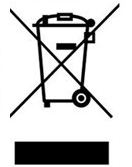WEEE refers to Waste Electrical and Electronic Equipment (WEEE) Directive (2002/96/EC)
Scrapped electronic and electrical equipment has a detailed definition of 'waste' in Directive 75/442/EEC and has been modified in Directive 91/156/EEC. Scrapping actually refers to all categories of products in Annex I of the WEEE Directive, even if the product has not reached the end of its service life stage, as long as it is discarded by consumers, it is considered waste.
Starting from August 13, 2005, manufacturers of electronic and electrical equipment circulating in the EU market must legally bear the responsibility of paying for the recycling of scrapped products. At the same time, EU member states are obligated to develop their own electronic and electrical product recycling plans and establish relevant supporting recycling facilities, so that end-users of electronic and electrical products can conveniently and freely dispose of scrapped equipment.
Producer Responsibility:
Design environmentally friendly products that meet the requirements of the ROHS Directive and register with EU member states.
Product identification requirements:
Producer name, production date, and relevant labels (with the recycling 'WEEE' label attached).
Country of passage
EU member states: Austria, Belgium, Cyprus, Czech Republic, Denmark, Estonia
Finland, France, Germany, Greece, Hungary, Italy, Ireland
Latvia Lithuania Luxembourg Malta Netherlands Poland
Portugal Slovakia Slovenia Spain Sweden UK
Bulgaria Romania
Croatia Türkiye
Trash container symbol

In the European Union, this symbol indicates that when the end user intends to discard this product, it must be sent to an appropriate facility for recycling and reuse.
Due to the fact that this product cannot be discarded together with other household waste, the amount of waste sent to incinerators or landfills will be reduced, which will also save natural resources.
The main content of the label includes a crossed wheeled garbage bin and a thick black line below it to distinguish it from other recycling instructions, such as the recycling label in the waste battery instruction.
The black solid line in the above figure must be used together with the trash can and cross markings. There must be no other markings, text, or messages inside, and the height h must be greater than 0.3a or 1mm.
If it is necessary to adjust the lines (thickness, smoothness, etc.) of the above image due to self made or other limiting factors, it is possible, but it is necessary to maintain the basic appearance and visually identifiable effect of the original image.
Due to the lack of guidelines for testing the wear resistance standards of the WEEE logo, a simple testing method has been developed in EN 50419, which involves rubbing a wet cloth soaked in water for 15 seconds while holding it, and then rubbing it with a wet cloth soaked in industrial alcohol for 15 seconds.
After the above tests, the markings must be clearly visible and cannot be easily erased, and the markings or markings after use must be kept free from curling.
Schedule for the Implementation of the Directive on Scrap Electronic and Electrical Equipment
date
Directive published in official EU publications on February 13, 2003
On August 13, 2004, EU member states implemented national regulations
On August 13, 2005, the manufacturer ensured that the recycling system was in place and that equipment entering the EU market should be labeled with WEEE labels
On December 31, 2006, EU member states should ensure the goal of collecting, recycling, and recycling scrapped electronic and electrical equipment
On December 31, 2008, EU member states should establish new targets for collection, recycling, reuse, and recycling
Social impact:
The rapid development of information technology has brought comfort and convenience to humanity, while the waste of related electronic and electrical products is increasing day by day. In order to properly handle these massive amounts of electronic and electrical waste while recycling precious resources, the European Union passed two directives in 2002 that have a significant impact on electronic and electrical equipment products, namely the WEEE and RoHS directives.
In addition to the European Union, countries around the world are actively formulating environmental regulations to minimize the content of harmful substances in waste, and require manufacturers or suppliers to shoulder relevant responsibilities to reduce environmental impacts.